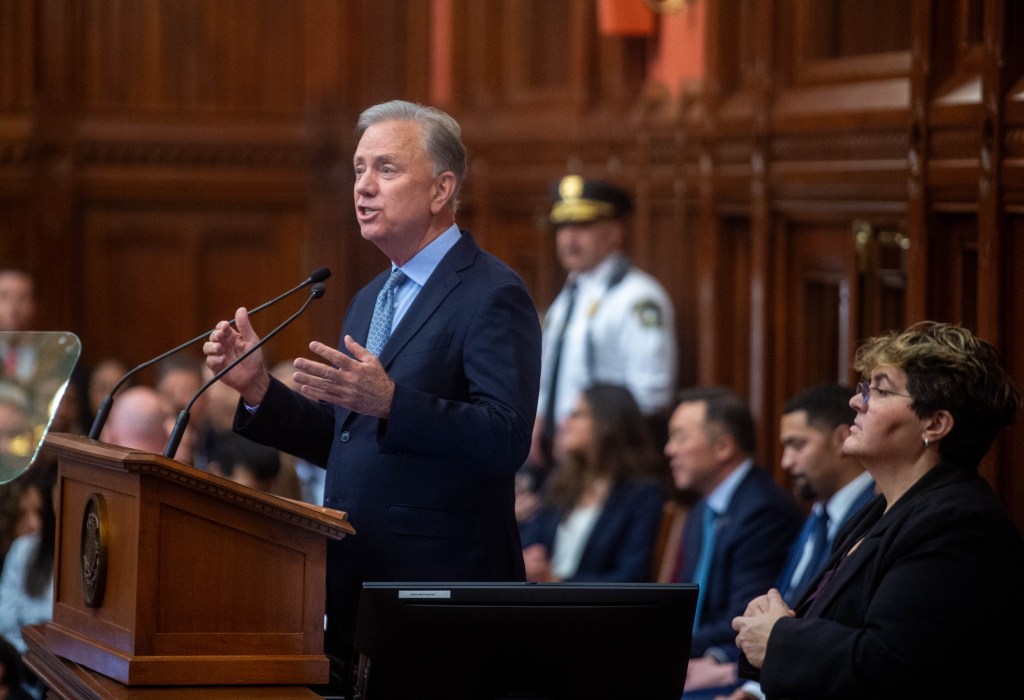As artificial intelligence gains speed across the country, Gov. Ned Lamont said Tuesday that he is still concerned about regulating the industry in Connecticut because he does not want to stifle innovation.
A former small business entrepreneur who created his own company, Lamont opposed a Senate bill last year, derailing the state legislature’s attempt to be the first in the nation to regulate artificial intelligence.
Democrats again this year hope to provide consumer protections through a process that will include hearings and votes in the coming months before the legislative session ends in June.
Connecticut, Lamont said, already has some protections that lawmakers are seeking.
“We have some of the most aggressive consumer protection laws in the country right now,” Lamont told reporters Tuesday in Hartford. “I will work with the attorney general on how exactly they could apply in this world of AI. Really what you want to do is making sure that those companies don’t have outcomes that are anti-consumer or biased or dangerous in some way. I think we have laws in place to do that. We’ll see if there is anything else we’ve got to do in terms of guardrails, but I also don’t want to do anything that slows up innovation and makes that smart, young programmer think that maybe it’s a little safer to do this in Georgia than it is in Connecticut.”
Connecticut should be more of an innovator than a regulator, Lamont says.
“Europe is a regulator leader,” Lamont said. “They’re the leaders of AI and social media regulation. They’re not much of an innovator. Name the great social media and AI companies in Europe. America has always been a great innovator, but our regulation is sort of a patchwork quilt and very erratic in that way. How to get that balance right is something I’ve got to work with Sen. [James] Maroney on.”
Maroney, a Milford Democrat, is the legislature’s leading authority on artificial intelligence and the co-chairman of the general law committee that oversees the industry.
Maroney and others are working on a balancing act to try to foster regulation at the same time as Lamont and others are concerned about restricting the growth of artificial intelligence.

But Lamont also indicated that he would sign a separate, narrowly written, standalone bill concerning deep-fake pornography that is created with artificial intelligence. Through technology, hackers can obtain an image of a person and then turn that single image into a pornographic video.
False images were spread on the internet of famed singer Taylor Swift, which gained widespread attention. The same methods can be used against average citizens and spread publicly as “revenge porn” against others.
“First off, it’s already illegal,” Lamont said when asked by The Courant. “So what you’re doing is belts and suspenders, but that sometimes makes people feel confident. And if it’s very specific to election fraud and deep-fake, you know, absolutely.”
Asked if he is afraid of snuffing out innovation, Lamont responded, “I do worry about that. I think it can discourage innovation. … But I also care about the consumer. That’s why I’m talking about our consumer protection laws and make sure they are current to the day and age we live in.”
Regarding business executives who are concerned about regulation in a fast-changing industry, Lamont said, “This is so new. We’re just sort of winging it a little bit here. … You’ve got to know what you’re regulating and be very strict about it. If it’s ‘I don’t like algorithms that create biased responses, that can go any of a million different ways.’ … So I just think you’ve got to be very careful about it.”
On Tuesday, Lamont attended the launch of the Connecticut Online AI Academy at a news conference at the Artists Collective in Hartford’s North End. Charter Oak State College has partnered with technology giant Google to create the academy that is designed to help teach skills to workers so that they will be able to handle the jobs of the future.
The program is described as “a transformative initiative designed to bridge the AI skills gap and empower Connecticut residents with the tools needed to thrive in the modern workplace.”
Those seeking to learn the skills can register for the free, online program at workforce.charteroak.edu.
Ongoing debate
Last year, the state Senate passed an AI bill, but the measure never received a vote in the state House of Representatives before time ran out on the final day on May 8. After Lamont signaled publicly that he would veto the bill, the House never debated the issue because leaders said the debate would be a waste of time if the measure was facing a guaranteed veto.
After more than four hours of debate in April 2024, the Senate voted 24-12 for the bill on strict partly lines as all Democrats were in favor and all Republicans were against. Some Republicans argued that the measure, known as Senate Bill 2, would be adding more regulations on small businesses.
The 53-page bill would have expanded criminal laws to include “deep fakes” as the measure established “a new crime of unlawful dissemination of a synthetic intimate image” and prohibited anyone “from distributing any deceptive media before an election or primary.”
The measure would have required developers of artificial intelligence “to use reasonable care to protect consumers from any known or reasonably foreseeable risks of algorithmic discrimination” based on factors like age, religion or ethnicity, according to a nonpartisan bill summary.
During the Senate debate, Sen. Tony Hwang, a Fairfield Republican who served on the 21-member AI task force that issued a 255-page report, said powerful computers are already having an impact on Americans’ lives. AI will be involved in “potentially how we shop … potentially who we get our news from” in daily life, he said.
“If we get it wrong in a technology field that is moving at remarkable speed … for many businesses, it’s life or death,” Hwang said. “They may leave the state or they may do the wrong thing and lose their business. … The technology changes minute by minute, not day by day. This technology is changing so fast.”
Christopher Keating can be reached at ckeating@courant.com
Originally Published:




